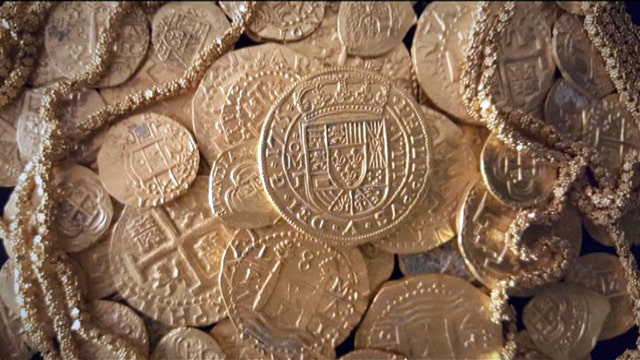A Florida man has uncovered gold artifacts worth over $1 million from the wreckage of a Spanish fleet that sank in a storm off the Florida coast three centuries ago.
The find by Eric Schmitt was announced late Monday by a salvage company that owns the rights to the site where the coins and jewels were found.
"The treasure was actually found a month ago,” Brent Brisben of 1715 Fleet — Queens Jewels LLC told Florida Today. Keeping word of the haul from getting out was "particularly hard for the family that found it," Brisben added. "They’ve been beside themselves."
Among the artifacts are 51 gold coins, 40 feet of gold chain, and an extremely rare coin called a "Tricentennial Royal", minted for King Philip V of Spain. Schmitt told the Orlando Sentinel that the "Tricentennial Royal" alone is worth approximately $500,000 due to its rarity and near-perfect condition.
"These things were known as presentation pieces not meant to be circulated as currency," Schmitt said of the "Royal" coins, of which only about six are known to exist.
The Sentinel reported that Schmitt found the gold while diving off Fort Pierce, just north of Port St. Lucie, while on his annual treasure-hunting trip with his wife, sister, and parents.
The find was announced almost exactly 300 years to the day after 11 of 12 Spanish ships carrying an estimated 3.5 million pesos in gold and jewels, including some belonging to the Queen of Spain, sank in a hurricane while en route from Havana. More than 1,000 crew members were killed. Brisben told Reuters that the value of the ships' cargo would amount to about $400 million in today's money. Of that total, approximately $157 million has been recovered.
The Schmitts are subcontractors of Brisben's company, and have had success in their searches in each of the past two years. In 2013, the family found several pieces of a solid gold chain that ultimately measure more than 60 feet. Last year Schmitt found the back portion of a handcrafted gold-filigree pyx, a vessel used to hold the Eucharist during the observance of Holy Communion.
Under federal and Florida law, up to 20 percent of the treasure will be turned over to the state for display in a museum, while Brisben's company and the Schmitts will split the remainder.









































